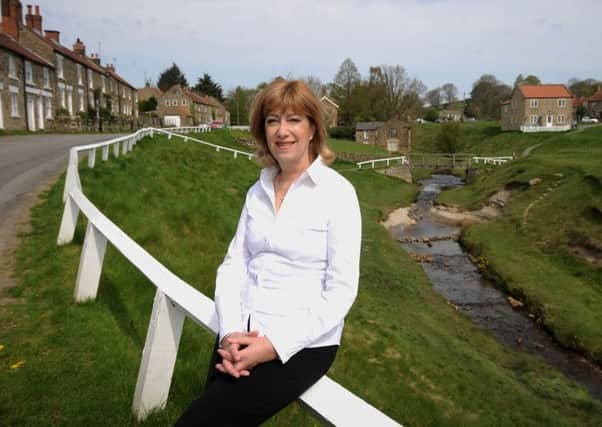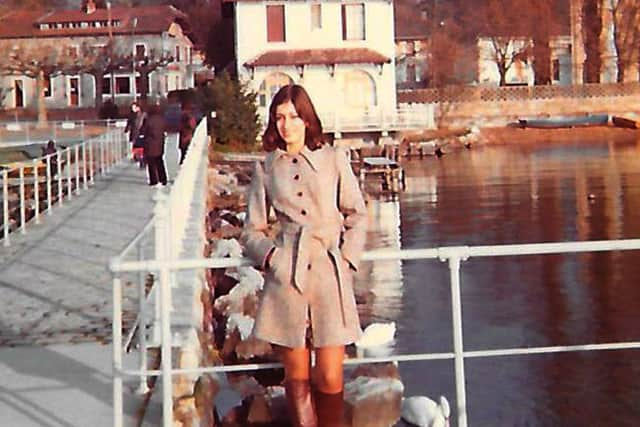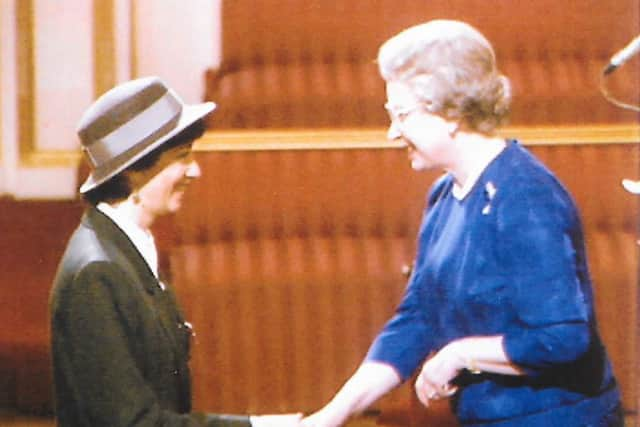Jean Harrod: The diplomat from behind the Iron Curtain now living life as a Yorkshire novelist


MOST new brides enjoy their first days of married life on a sun-kissed honeymoon in some far-flung destination. Jean Harrod spent hers in a one bedroom flat overlooking Karl Marx Alley in East Berlin, where bullet holes pockmarked the walls.
This being the height of the Cold War, she was well aware that the Stasi – East Germany’s secret police – were watching. “We knew that we were being bugged in our home, our car, our office.
Advertisement
Hide AdAdvertisement
Hide Ad“We had East German guards at the front door of the embassy, but I always said they weren’t there to protect us, they were to stop people coming in.”


Writing about the tangled world of international relations comes easily to a woman who spent more than three decades as one of Britain’s foremost diplomats.
A callow 19-year-old when she was plunged into top secret Cold War negotiations, Harrod found herself being sent behind the Iron Curtain with tension-filled postings, first in East Berlin and then in China.
Now she is drawing on her experiences with a series of page-turning thrillers featuring jet-setting diplomat Jess Turner which are already bringing comparions with former MI5 chief-turned-author Stella Rimington.
Advertisement
Hide AdAdvertisement
Hide Ad“It’s a diplomatic crime series, which hasn’t been done before,” Harrod explains at her home in the North York Moors. “I wasn’t sure how they would go but the first book has done really well and got some great reviews. Now I’m excited about the second.”


That first novel, Deadly Diplomacy, tells the tale of a British consul catapulted into a murder investigation in Australia, where Harrod was formerly a Deputy High Commissioner.
Having spent her career writing reports and briefings, a novel wasn’t too much of a leap. But although her own experiences in far-flung destinations inform her work, Harrod can’t stick too closely to the truth.
“I’m still bound by the Official Secrets Act,” she explains, “so I’m not allowed to write fact. But there is some in there about how consuls operate, what the countries were like.
Advertisement
Hide AdAdvertisement
Hide Ad“My books are all set in places where I’ve worked so they do tell a bit about what it was like to be a diplomat there and how things would unfold. Thankfully though none of the awful stuff that happens to my heroine happened to me.”


The novels are born of a thirst for adventure that started at an early age. Harrod has spent the last 30 years in North Yorkshire but grew up near Heathrow Airport.
She would stand in the garden as a girl, watch the planes pass overhead and dream of being on one of them.
The idea was to become a journalist, an intrepid reporter travelling the world. But while she was studying for her A levels someone from the Foreign Office came in to give a talk and scout for potential recruits.
Advertisement
Hide AdAdvertisement
Hide Ad“As soon as she started talking to me about all the different embassies and places that I could travel to I was completely hooked and determined to get in.”


Much to her surprise, she did just that. “I was one of the youngest and in awe of everything. I was told I would be there for three years before I could go on any overseas postings because I was so young.
“But I’d only been there eight months when they rang me up and asked did I want to go temporarily to Geneva for a conference? It was a comprehensive dialogue with the Soviet Union, trying to thaw relations across a wide range of areas. So at the age of 19 I was plunged into East-West relations. It was an eye-opener and I loved every minute.”
It was there that she met future husband Jeff, a fellow British diplomat. But these were different times and the pair were warned not to bring shame on the government. Told in no uncertain terms to tie the knot, they did just that. But Harrod recalls it as a “bittersweet time” because back then female Foreign Office staff were meant to retire upon marrying.
Advertisement
Hide AdAdvertisement
Hide Ad“I had a job I loved so I wasn’t going to go quietly. I was invited to resign and I just shoved the letter in a drawer, hoping to stay under the radar a bit longer. I got away with it for a few months and then got another letter, and I did the same with that one.”
Eventually there was a showdown but her boss told his superiors she was needed at the conference and to sort it out back in London once it had reached its conclusion. “Only this conference that was meant to last months ended up lasting two years,” she says. As if by magic, the Sex Discrimination Act came in. “It saved me. I was the first married woman in the Foreign Office who was allowed to stay on and have a career.”
The couple’s first posting saw them in at the deep end – the British Embassy in East Berlin, where they started married life in that poky flat overlooking Karl Marx Alley.
Harrod, whose task as a political officer was to study the state of the country from within, recalls the sense of desperation of those stuck behind the wall. “I saw lots of frantic arguments at checkpoints as people were stopped. East Germans trying to escape to the West were being shot dead.”
Advertisement
Hide AdAdvertisement
Hide AdNext they went behind the Bamboo Curtain with a stint in Peking in 1980. If anything, the Chinese were even more suspicious, but Harrod enjoyed it just the same.
“Mao Tse-tung had died four years earlier and it was still a very closed country so it was fascinating to be a diplomat there then. It was before the internet and glocal communications so we were very cut off.
“The only thing on television were these four-hour documentaries about the Long March. But Jeff went to Hong Kong and brought back a shortwave radio. For about two hours every night we could get the BBC World Service and hear what was going on in the outside world.”
It was a subsequent posting to Jakarta, Indonesia, which planted the seed of the idea to write novels.
Advertisement
Hide AdAdvertisement
Hide AdAs consul, Harrod was responsible for the protection of British citizens and quickly found that Indonesia was a dangerous country. In 1996, a group of Cambridge University students were kidnapped by terrorists and she spearheaded efforts to secure their release. It ended with a gunfight in the jungle which saw the four students escape with their lives.
“I spent a lot of time in the morgue identifying bodies from passport photos and dealing with the police on investigations. I thought, one day I’m going to write diplomatic crime thrillers. So that’s what started it, and all these years later here I am.”
Her second novel, Deadly Deceit, is set in the exotic Turks and Caicos Islands where she was based for several years. It’s a timely story of illegal migration and the lengths the authorities will go to stop it.
“I’m having fun and want to take everybody all around the world,” Harrod says of her new adventure in writing. “I want to see just how far I can go with it.”